Baker Academic Bible Interpretation Collection (12 vols.)
Digital Logos Edition
Overview
Expand and deepen your exegesis with the Baker Academic Bible Interpretation Collection. This 12-volume collection brings together hundreds of contributors to help you interpret the Bible. It introduces you to the methods, terms, and concepts used by exegetes—and provides you a guide to inductive Bible study.
Discover the impact female interpreters have had in the history of Christianity. Find out how the Old Testament and New Testament storylines relate to each other and weave together in Christ. Learn to interpret Old Testament citations in the New Testament. Explore seven key elements of biblical exegesis.
This title is included in the following collections
You can save when you purchase this product as part of a collection.
 Baker Academic Bible Interpret...$385.99$385.99
Baker Academic Bible Interpret...$385.99$385.99Baker Academic Biblical Studie...
$3,999.99$3,999.99Baker Ultimate Collection 2022...
$38,273.89$30,599.99
- Provides readers a guide to biblical interpretation, exegesis, and hermeneutics
- Emphasizes the importance of biblical interpretation for understanding the historical and contemporary relevance of Scripture
- Compiles contributions from hundreds of scholars
- Title: Baker Academic Bible Interpretation Collection
- Publisher: Baker Academic
- Volumes: 12
- Pages: 5,560
- Resource Types: Handbooks, Introductions
- Topic: Interpretation & Hermeneutics
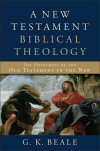
In this comprehensive exposition, a leading New Testament scholar explores the unfolding theological unity of the entire Bible from the vantage point of the New Testament. G. K. Beale, coeditor of the award-winning Commentary on the New Testament Use of the Old Testament, examines how the New Testament storyline relates to and develops the Old Testament storyline. Beale argues that every major concept of the New Testament is a development of a concept from the Old—and is to be understood as a facet of the inauguration of the latter-day new creation and kingdom. Offering extensive interaction between the two testaments, this volume helps readers see the unifying conceptual threads of the Old Testament and how those threads are woven together in Christ. This major work will be valued by students of the New Testament and pastors alike.
Certainly Beale has written his magnum opus, in which he deftly integrates the Scriptures via the new creation theme. The use of the Old Testament in the New Testament forms the backbone of this work so that readers grasp how the storyline of Scripture coheres. We stand in debt to the author for his detailed and profound unfolding of New Testament theology.
—Thomas R. Schreiner, James Buchanan Harrison Professor of New Testament Interpretation, The Southern Baptist Theological Seminary
It is tempting to confess that dogmaticians merely rummage around in the mines of biblical theologians. With this volume, the quarry has been enlarged and deepened, exposing the richest veins. I found it to be not exactly a page-turner, but rather on almost every page I discovered another spot at which to linger before moving on. Drawing on decades of exegetical research and teaching, A New Testament Biblical Theology exists at the intersection of biblical studies and theology. Carrying on the tradition of Geerhardus Vos, Professor Beale has raised the bar for biblical theology in our day. We will be digesting this volume for many years to come.
—Michael Horton, J. Gresham Machen Professor of Systematic Theology and Apologetics, Westminster Seminary California
This is like a New Testament theology but goes far beyond. It does not merely describe a part of Scripture from the outside; the view is rather interior, developing themes and movements from within the whole Bible’s own storyline. Beale does full justice to motifs often neglected. Like no other work I know, A New Testament Biblical Theology gives eschatology (and not just futurology) full due. He writes understandably and frequently engages in exegesis, which reduces generalizations and unsupported assertions. The treatment is theocentric, missional, and doxological. Reflecting 30 years of research and with some six hundred books in its bibliography, this volume is unique in our time and in fact without close parallel in a discipline (biblical theology) that split the Old Testament off from the New over two hundred years ago. Beale has brought them back together in a creative and methodical way. The results will provoke a deeper grasp of God’s redemptive aims and further research. For some readers, like this one, a major result will be not only appreciation but also awe at such a masterful treatment of so much of Scripture’s wealth.
—Robert W. Yarbrough, professor of New Testament, Covenant Theological Seminary
This New Testament biblical theology makes the Old Testament storyline the point of departure for exploring the New Testament message. Beale’s volume is far reaching, written at a high scholarly level, and conversant with a wide range of scholarship. Even where one may disagree, Beale’s treatment is always informative and at times even provocative. A very important contribution to biblical theology that deserves to be widely read.
—Andreas J. Köstenberger, senior professor of New Testament and biblical theology, Southeastern Baptist Theological Seminary
A magnificent achievement! Rarely does a volume in biblical studies come along with such breadth, depth, insight, and specificity. It is a brilliant reconstruction of themes that are central to Christian faith. This is a landmark accomplishment.
—David F. Wells, distinguished research professor, Gordon-Conwell Theological Seminary
The canonical scope and focus on the biblical storyline give Beale’s New Testament Biblical Theology a unique place among the many New Testament theologies now available. The book is vintage Beale, creatively making connections between Old Testament and New Testament and pursuing a definite vision of how the Bible hangs together.
—Douglas J. Moo, Kenneth T. Wessner Professor of New Testament, Wheaton College
Some New Testament theologies emphasize the distinctiveness of each author or book; others seek a center or unifying theme. Beale’s work is decidedly in the second category as he demonstrates new creation as an umbrella category covering all of the other major motifs not only in the New Testament but also in the relevant Old Testament and Second Temple Jewish background material. Along the way, readers are treated to outstanding up-to-date discussions of most of the main topics they have come to expect and some new ones, especially in light of intracanonical connections. Throughout, Beale is thoroughly evangelical and thoroughly scholarly. This work is a true tour de force.
—Craig L. Blomberg, distinguished professor of New Testament, Denver Seminary
This volume, impressive for its massive sweep, is the matured fruit of the author’s extensive work over several decades in New Testament theology. A biblical theology concerned with showing the unity and coherence of all biblical revelation in its rich diversity, it explores the various ways the New Testament storyline transforms, as it develops and fulfills, the central elements of the Old Testament storyline with the new creation kingdom seen as the comprehensive outcome of the already-not yet eschatological fulfillment effected by the life, death, and resurrection of Christ. Especially those with interests in biblical eschatology, with some attention to the role of the church and Christian living ‘between the times,’ as well as in the New Testament use of the Old will profit from the characteristically sound and often stimulating instruction Professor Beale provides.
—Richard B. Gaffin Jr., professor emeritus of biblical and systematic theology, Westminster Theological Seminary, Philadelphia
G. K. Beale has been harvesting the fields of biblical theology in major biblical commentaries and exegetical/theological studies for many years. Here now is his biblical theology magnum opus. A New Testament Biblical Theology draws together and generously supplements many strands of Beale’s earlier work into a comprehensive and mature expression of the whole. Beale locates the ‘organic progress of supernatural revelation’ not in a particular central doctrine or idea, but in the Bible’s grand storyline, the story of God establishing his new-creational kingdom through Christ and the Spirit. As with all of Beale’s works, this volume is brimming with rich and deeply satisfying redemptive-historical exegesis. This provides an enormous feast for anyone wishing to understand in greater detail the thrust of the Bible’s saving story, but it also results in a great contribution to scholarship—a broad, well-researched, and well-constructed foundation for future scholarly endeavors in biblical theology.
—Charles E. Hill, professor of New Testament, Reformed Theological Seminary Orlando
A New Testament Biblical Theology takes Beale’s years of study, teaching, and research and presents his readers with the most thorough and mature work of New Testament biblical theology yet seen in the English language. He has structured the massive volume in a beautiful fashion, focusing nearly half of the work on the eschatological storyline of the Old Testament, then moving to the story of the already-not yet latter-day resurrection and new-creational kingdom of the New. His other major themes are sin and restoration, salvation as new creation, the work of the Spirit, and the church and Christian living. The thorough and readable volume demonstrates the contours of the grand sweep of God’s great revelation to sinful men and women through the exalted Lord Jesus Christ.
—Richard C. Gamble, professor of systematic theology, Reformed Presbyterian Theological Seminary
In your hands is a gold mine of biblical scholarship, a distillation of a lifetime of study by one of the most respected New Testament scholars of our day. Beale treats his subject with devotion, his opponents with charity, and his readers with respect. Beale’s arguments and conclusions are presented with such clarity and force that any interested reader, whether pastor, layperson, or professional scholar, will be able to benefit from the rich insights that appear on almost every page. Beale provides the key that unlocks the storyline of the Bible, and with the help of his patient guidance, the reader discovers in one example after another the power of that storyline to highlight the inner coherence of biblical truth across the Testaments and to open up new vistas of understanding of many of the Bible’s best-known stories, as well as some of its most obscure texts.
—Gordon P. Hugenberger, adjunct professor of Old Testament, Gordon-Conwell Theological Seminary
Greg Beale’s New Testament Biblical Theology is a stimulating read. Beale understands well how the two testaments relate and how essential the redemptive story of the Old Testament is for understanding God’s work in Jesus Christ and his church. Readers will find the emphasis on the already-not yet end-time new creation and kingdom very enriching and insightful. What we have in this new biblical theology is an appreciation for the biblical story as a whole, an appreciation that provides a much-needed counterweight to the atomistic tendencies in much of our exegetical and theological work. Beale’s book will make an important contribution to a field of study that continues to redefine itself and move into new and interesting directions.
—Craig A. Evans, Payzant Distinguished Professor of New Testament, Acadia Divinity College
Biblical scholars and theologians, after long separation and now perhaps with a healthier sense of their own historical location, have recently found themselves engaged on a common project: what is it that binds the church’s canonical texts together? Reflecting its author’s situatedness within the evangelical Reformed tradition and firm commitment to exegetical integrity and the priority of the biblical storyline, Greg Beale’s extensive and detailed new book is a most welcome addition to the ongoing discussion.
—Rikk Watts, associate professor of New Testament, Regent College
New Testament Biblical Theology will stand with the titans of the genre. . . . Paul wrote to Titus that overseers must hold firmly to the trustworthy word as taught, give instruction in sound teaching, and be able to refute those who contradict it (Titus 1:7, 9). Beale’s scholarly work is important and courageous because he is doing precisely these things. Beale is holding firmly to the trustworthy word as he takes pains to understand the Bible. . . . I am so grateful for the stimulating work of G. K. Beale. . . . Anyone interested in biblical theology should read his work.
—Midwestern Journal of Theology
Talk to any New Testament professor in any evangelical seminary and they’ll all say the same thing: PhD programs are packed with students who want to explore the New Testament’s use of the Old Testament. But beyond PhD programs we find this interest elsewhere. Pastors everywhere are motivated today to preach through Old Testament books in order to point to Christ. Not long ago many would have felt uneasy or ill-equipped to do so. Part of this growing interest can be credited to scholars like G. K. Beale. . . . Beale’s new book, A New Testament Biblical Theology, might be the most celebrated of his distinguished career.
—The Gospel Coalition
G. K. Beale is a professor of New Testament and biblical theology at Westminster Theological Seminary in Philadelphia, Pennsylvania. He is a coeditor of the Commentary on the New Testament Use of the Old Testament and the author of numerous books.
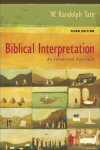
The third edition of Biblical Interpretation focuses on the three “worlds” of biblical interpretation—the world behind the text, the world of the text, and the world in front of the text. A fourth section helps readers combine the three worlds into an integrated hermeneutical strategy. Clear explanations of the various interpretive approaches are supported by helpful biblical examples. Key terms and study questions at the end of each chapter make this book ideal for classroom use. Succinct synopses highlight a host of distinct approaches to understanding the Bible. New synopses and an updated bibliography help readers keep pace with the most recent developments in biblical interpretation.
Tate offers an informed and balanced study of variety in biblical interpretation. His command of primary and secondary sources and his clarity of presentation make this book a vade mecum for students and teachers.
—Phyllis Trible, university professor of biblical studies, Wake Forest University
In this significantly expanded edition of his textbook, W. Randolph Tate brings the advantages of an integrated understanding of biblical hermeneutics to a new generation of interpreters. He does more here than simply clarify his explanations of methods and add updated bibliographical references. In this edition Tate more fully applies his ‘three worlds’ typology to an orientation of biblical hermeneutics vis-à-vis the plethora of critical methods now in regular use among increasingly diverse contemporary literary and biblical interpretive communities. In the process his typology proves itself a flexible and reliable framework for the study of biblical hermeneutics.
—William Yarchin, professor of biblical studies, School of Theology, Azusa Pacific University
Tate’s 1991 book carefully sketched out the differences between and the interrelationships among the world behind the text, the world within the text, and the world in front of the text. The second and revised edition (1997) provided additional information about the relationship between the text and the reader: ‘What Happens When We Read?’ His third edition addresses some of the new insights into hermeneutics that have appeared within the last decade. While short lists of relevant resources are included throughout the book after each section, a 22-page bibliography can be found at the end of the book. These bibliographies, along with the author, subject, and biblical text indices at the end, add to the usefulness of this first-rate book as a textbook for studying biblical interpretation.
—The Bible Today
While Tate insists that his is not a textbook on critical methodologies, one of the outstanding features of this volume is its insistence on providing an accessible (and of necessity, brief) introduction to the seemingly inexhaustible list of methodological approaches currently at the disposal of the contemporary biblical interpreter. Not surprisingly, given Tate’s work on Mark, the volume excels toward the end when illustrating the merging of Tate’s ‘three worlds’ in his interpretation of the second gospel. . . . An array of indexes, a steady stream of discussion questions, and well-stocked lists of further reading make this a very usable introduction to contemporary biblical interpretation.
—Vetus Testamentum
Tate’s third edition of his Biblical Interpretation reveals a mature approach to the subject of hermeneutics. . . . Review questions are included with each chapter to help the reader think through the issues. . . . The book is especially helpful for those who have already studied hermeneutics and exegesis. . . . Readers will also benefit from Tate’s discussion of critical methods. . . . This volume is a helpful addition to resources on interpretation. Its focus on three worlds [author, text, and reader] provides a perspective that will help readers balance their approach in the exegetical process.
—Bibliotheca Sacra
W. Randolph Tate is a professor of humanities at Evangel University in Springfield, Missouri, where he has taught for more than 25 years. He is the author of several books, including Handbook for Biblical Interpretation: An Essential Guide to Methods, Terms, and Concepts, 2nd ed. and Interpreting the Bible: A Handbook of Terms and Methods.
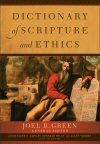
This one-stop reference book on the vital relationship between Scripture and ethics offers helpful orientation and perspective for students, pastors, and scholars. Written to respond to biblical scholars and ethicists’ movement to recover the Bible for moral formation, it is the best reference work available on the intersection of these two fields. The volume shows how Christian Scripture and Christian ethics are necessarily intertwined and offers up-to-date treatment of five hundred biblical, traditional, and contemporary topics, including tithing, euthanasia, the Trinity, population policy and control, healthcare systems in Scripture, the seven deadly sins, idolatry, the image of God, terrorism, the Sermon on the Mount, vegetarianism, and the Dead Sea Scrolls. The stellar ecumenical list of contributors consists of more than two hundred leading scholars from the fields of biblical studies and ethics.
Wide-ranging, thorough, and cautious, the Dictionary of Scripture and Ethics will be a helpful resource for both students and scholars. With its mix of different kinds of articles and its attention throughout to biblical materials, the dictionary meets a significant need and provides something for almost any reader.
—Gilbert Meilaender, Duesenberg Professor in Christian Ethics, Valparaiso University
A book as ambitious as the Dictionary of Scripture and Ethics risks being too superficial to be helpful. I am happy to report that this is not the case for this imaginatively conceived and organized book. This book will quickly become an indispensable resource for Christian reflection on the moral life.
—Stanley Hauerwas, Gilbert T. Rowe Professor of Theological Ethics, Duke Divinity School
The dictionary provides a wonderful tool for exploring the relationship between Scripture and ethics. Essays providing an overview of the moral concerns of Scripture and the shape of Christian ethics usefully frame an array of detailed articles. Some articles treat biblical books, others ethical topics, including virtues and vices, denominational traditions, contemporary topics such as environmental ethics, and controversial subjects such as homosexuality. The treatments are comprehensive and honest, informed by critical perspectives on the Bible and contemporary ethical reflection. They do not shy away from issues where churches, by their own admission, have misused Scripture (e.g., ‘apartheid’). This volume is a rich resource for biblical scholars and ethicists alike.
—Harold W. Attridge, The Rev. Henry L. Slack Dean and Lillian Claus Professor of New Testament, Yale Divinity School
Renewed interest in the relationship between Scripture and ethics has created the need for an accessible and reliable guide to the issues and the literature. This is it.
—R. W. L. Moberly, professor of theology and biblical interpretation, Durham University
Pastors, laypeople, and scholars alike will find in this exceptionally valuable resource wise guidance for Christian life and discernment about ethical issues. It offers an excellent blend of substantive engagement and methodological reflection from well-respected scholars. Highly recommended.
—L. Gregory Jones, professor of theology, Duke Divinity School
Scholars in the fields of Scripture and ethics are increasingly engaged in important conversations, and this volume is an excellent contribution to that dialogue. This star-studded grouping of contributors from biblical, ethical, and theological disciplines covers a remarkable range of pertinent topics, including every biblical book and every lively ethical topic. This invaluable reference tool will serve both lay readers and scholars very well indeed and contribute to the continuing interaction among them in thoughtful and provocative ways.
—Terence E. Fretheim, Elva B. Lovell Professor of Old Testament, Luther Seminary
This is a wellspring of wisdom that will prove to be of immense value to the church. As we deal daily with questions of how Scripture relates to the vast and growing ethical challenges posed by today’s society, the Dictionary of Scripture and Ethics will be a reliable source of insight and guidance. Its contributors are respected voices who have reflected deeply on challenges of Christian ethics, and this compilation is a treasure trove of rich and helpful perspectives.
—Wes Granberg-Michaelson, general secretary, Reformed Church in America
The relationship of biblical studies to moral theology has not been given the attention it merits by biblical scholars. This impressive volume has pulled together important articles on a wide range of topics that will certainly be of importance to systematic and moral theologians. The selection of topics is broadly ecumenical and should appeal to the widest possible audience. Let us hope that this volume will spur a new generation of studies to reflect more carefully and systematically on the moral teachings and legacy of the Bible.
—Gary A. Anderson, Hesburgh Professor of Catholic Theology, University of Notre Dame
The Dictionary of Scripture and Ethics is a unique reference work, drawing together topics that are intimately connected but often relegated to separate spheres. Letting both spheres identify the topics, the editors have compiled a comprehensive handbook for thinking about the realm of ethics and the moral life but with particular attention to what the Bible has to say about such matters. At the same time, new directions are opened up as biblical texts and topics not often associated with ethical issues are seen to have much to say. Scholars in both fields will want to have this volume in their library.
—Patrick D. Miller, professor emeritus of Old Testament theology, Princeton Theological Seminary
It is rare indeed for a dictionary to be a page-turner, but this one makes the reader want to find a comfortable chair and a lot of free time to roam through it. The scope of the articles is remarkable as is the quality of the research and writing. If any single volume can help us draw well-informed connections between the thought-world of Scripture and the contemporary contexts in which we teach, preach, and seek to live as people of faith, this may be it.
—Ellen F. Davis, Amos Ragan Kearns Professor of Bible and Practical Theology, Duke Divinity School
With articles on every biblical book, [this text] offers preachers a welcome guide to the ethical import of scripture. With entries on almost any issue readers might confront, it is an invitation to start with a ‘hermeneutics of engagement,’ rather than a ‘hermeneutics of dismissal.’ Three orienting essays introduce the book, guiding us into the subtle depths and multiple interrelations hidden in the conjunction of Scripture and ethics.
—Christian Century
This reference tool seeks to bring together a survey of the literature, issues, concepts, and challenges related to the studies of both biblical scripture and Christian ethics for students, pastors, and scholars. . . . This is a well-organized volume that surveys the relationship between these two disciplines in detail. . . . It is recommended for libraries serving students and scholars of religion, religious leaders, or laypersons with a particular interest in this topic—such as those in Bible study groups.
—Booklist
Joel B. Green is the professor of New Testament interpretation and associate dean of the Center for Advanced Theological Studies at Fuller Theological Seminary in Pasadena, CA. He is the author or editor of numerous books, including the the Dictionary of Jesus and the Gospels, Introducing the New Testament, and commentaries on Luke and 1 Peter. He is also editor-in-chief of the Journal of Theological Interpretation.
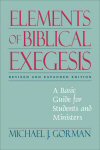
In this revised and expanded edition Michael J. Gorman presents a straightforward approach to the complex task of biblical exegesis. Designed for students, teachers, and ministers, this hands-on guide breaks the task down into seven distinct elements. For each of these, Gorman supplies a clear explanation, practical hints, and suggested exercises to help the reader develop exegetical proficiency. The new edition addresses more fully the meaning of theological interpretation and provides updated print and internet resources for those who want to pursue further study in any aspect of exegesis. Appendixes offer three sample exegesis papers and practical guidelines for writing an exegetical resarch paper.
‘Exegesis’ is not only a strange word, but it can also be a daunting assignment for the newcomer to formal biblical studies. Equally, teaching exegesis can challenge even the seasoned instructor. For both student and teacher, Michael Gorman is a dependable guide and patient companion along the way. My only question is: Where was Elements of Biblical Exegesis when I was a student?
—Joel B. Green, professor of New Testament interpretation, Fuller Theological Seminary
No one ever became an exegete by reading a book on exegesis. The gift of Michael Gorman’s book is that he knows that exegetes are born through practice, practice, and more practice. And he invites his readers into just the practice they need, providing them with a rich array of helps along the way. Beginners and improvers alike will benefit from this revised and expanded edition.
—Beverly Roberts Gaventa, Helen H. P. Manson Professor of New Testament Literature and Exegesis, Princeton Theological Seminary
This widely used guide provides students, teachers, and ministers with a practical approach to biblical exegesis that is built on a strong theoretical foundation. This revised and expanded edition addresses more fully the meaning of theological interpretation that attends to the biblical text as a vehicle of divine revelation and address.
—Interpretation
This is clearly a guide to exegesis. The steps that comprise each approach are explained and elucidated by helpful tables. A step-by-step guideline for writing an exegetical paper as well as sample research papers are found at the end of the book. This is the kind of guide all serious biblical students should study.
—The Bible Today
[Gorman] provides a practical page-by-page outline of what a 15-page exegetical paper should look like, gives good pointers on constructing an outline, and literally walks the student through the process with key questions, summaries, and hints. The three papers in the third appendix also faithfully replicate the author’s process.
—The Master’s Seminary Journal
Gorman gives practical hints on how to discern the genre, structure, and movement of a passage of Scripture. . . . He helpfully differentiates between different types of ambiguity and draws a distinction between polyvalence and unconstrained interpretation. . . . The book closes with annotated bibliographies of different types of resources for exegesis and three sample exegesis papers. This book is an advance on some other guides that only think in terms of classic types of criticism and fail to reflect the rediscovery of theological interpretation and stop short of practical application. Gorman scores well on these points.
—Reformed Theological Review
Perhaps the author’s most valuable philosophical contribution to the task of exegesis . . . is his threefold view of exegesis as investigation, conversation, and art. . . . The book may appeal to general audiences who want to master the basics of biblical exegesis or who wish to explore Scripture from a sound platform. Pastors would benefit by adopting basic principles of exegesis to inform their weekly sermons. Perhaps the strength of the book, however, lies in the time it spends defining the task of exegesis and preparing the student to understand the implications of exegesis. . . . [Gorman’s] methodology . . . provid[es] an insightful guide that can inspire students, laity, and ministers to take the study of the Scriptures more seriously by applying solid elementary principles with effective scholarly skills that can, finally, lead to sound conclusions.
—Andrews University Seminary Studies
Michael J. Gorman is a distinguished research professor of Sacred Scripture at St. Mary’s Seminary and University in Baltimore. He formerly served as dean of the Ecumenical Institute of Theology at St. Mary’s.
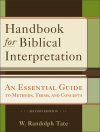
Handbook for Biblical Interpretation: An Essential Guide to Methods, Terms, and Concepts
- Author: W. Randolph Tate
- Edition: 2nd
- Publisher: Baker Academic
- Publication Date: 2012
- Pages: 544
This handbook provides a comprehensive guide to the methods, terms, and concepts used by biblical interpreters. Offering students and nonspecialists an accessible explanation of the complex vocabulary that accompanies serious biblical studies. Articles, arranged alphabetically, explain terminology associated with reading the Bible as literature, clarify the various methods Bible scholars use to study biblical texts, and illuminate how different interpretive approaches can contribute to our understanding. Article references and topical bibliographies point readers to resources for further study. This handbook is now updated and revised to be more useful for students. It is a suitable compliment to any standard hermeneutics textbook.
Randolph Tate’s Handbook for Biblical Interpretation is an indispensable reference for any student new to academic biblical studies. I have required the previous edition as a textbook for my biblical hermeneutics classes since its publication. Tate provides just the right amount of information for hundreds of terms that are the working vocabulary of biblical scholarship. The brief bibliographies point to the next level of depth for students ready to investigate further. For those who have been out of seminary for several years, Tate provides longer articles to introduce recent literary and agenda criticisms. No seminarian, seminary graduate, or graduate student of Bible should be without this work.
—Roger L. Hahn, Willard H. Taylor Professor of Biblical Theology, Nazarene Theological Seminary
Hermeneutics has become a huge, difficult area in recent years, with a plethora of different methods, schools of thought, and divergent views on how it should be conducted. Tate’s Handbook is an important resource for students and scholars who don’t have time to keep up with the various movements and who find themselves confused by current shifts. It is an invaluable resource for serious biblical understanding.
—Grant Osborne, professor of New Testament, Trinity Evangelical Divinity School
Confused about the difference between exegesis and eisegesis? Unclear about the ‘hermeneutical spiral’? This A to Z reference book will be a handy guide for those students of biblical interpretation who long for clear, succinct definitions of terms and the various approaches. Tate models this after the classic Handbook to Literature, which has coached thousands of students in the difference between literary criticism, narrative criticism, reader-response criticism, and other techniques. His book, however, deals solely with methods of biblical interpretation, applying the various schools of thought to biblical hermeneutics. Particularly helpful are his explanations of contemporary approaches like mujerista theology (which merits a full six pages) and deconstructionism. No seminarian or biblical scholar should be without this easy-to-use reference work.
—Publishers Weekly
This is an extremely helpful reference tool, and Tate deserves the gratitude of scholars, students, and lay readers alike for producing it.
—Review of Biblical Literature
The work covers a very wide range of topics. . . . Entries that give straightforward definitions do not have bibliographies or references attached, but those dealing with particular theories, processes, or concepts are provided with essential further references to allow the enquirer to pursue the topic further. There are numerous and extensive cross-references which make it much easier to find the necessary information, especially for the general reader who may not be familiar with the terminological structure of the disciplines involved. . . . Each entry is clearly written and well structured, often with examples from Scripture to illustrate particular points. . . . This book deserves to be considered as a useful tool for the non-religious library or scholar. It provides a wealth of valuable information about many aspects of the Bible, literary criticism, social and cultural anthropology, philosophy, and philology. For the religious-minded it gives the opportunity to find depth and greater understanding in many well-known and often overplayed texts. As a scholarly work it stands with the giants in the field. Not only is it well written and excellently produced, but also the price is such that overstretched library budgets can easily accommodate it to make it accessible to members of the general public. It should find a place on every academic library shelf and also in the most modest of private collections built up by pastors and general readers. Thoroughly to be recommended.
—Emerald Reference Review
This is the most complete and up-to-date manual of biblical criticism. Very likely to be the authoritative standard resource on its subject, it is indispensable for everyone who seeks to understand why and how new types of literary criticism are developing into the leading paradigm of biblical studies. Highly recommended.
—International Review of Biblical Studies
An extremely competent work and a valuable resource for both students and scholars.
—Journal for the Study of the Old Testament
Tate has provided a helpful tool for beginning students as well as advanced graduates and even professors. The work is broad enough that it can be used in an array of disciplines, whether they pertain to the areas of Old Testament, New Testament, theology, linguistics, or philosophy of language. In addition, Tate maintains a difficult balance in being able to define terms accurately and many times concisely without being reductionistic or incoherent. So for the most part, a student can read a given article, be exposed to the fundamental usage of the word under consideration, and see how it coincides with other terms in the overall context of biblical and literary disciplines. . . . If a student or professor is interested in staying up to date on hermeneutics as a philosophical and/or biblical discipline, having access to this work can definitely aid in that goal.
—Journal of the Evangelical Theological Society
This handbook should find its way into the library of every serious student of the Bible and could be used as a textbook for foundations courses in biblical studies.
—Teaching Theology and Religion
This is a useful handbook both for students and biblical scholars who need some guidance on navigating the terminological waters of the newer criticisms.
—Religious Studies Review
W. Randolph Tate is a professor of humanities at Evangel University in Springfield, Missouri, where he has taught for more than 25 years. He is the author of several books, including Handbook for Biblical Interpretation: An Essential Guide to Methods, Terms, and Concepts, 2nd ed. and Interpreting the Bible: A Handbook of Terms and Methods.
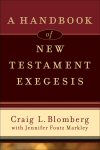
This accessible handbook provides a one-stop guide to the New Testament exegetical method. Seasoned New Testament scholar Craig Blomberg and his former research assistant Jennifer Foutz Markley offer both a broad overview of the exegetical process and a step-by-step approach to studying the New Testament in depth, helping readers understand the text and discuss it responsibly. The book is full of examples—interesting or controversial New Testament texts in the interpretation of which the methods under discussion truly make a difference. Professors and students in New Testament, Greek, hermeneutics, and exegesis courses as well as those involved in ministry will value this work’s sound guidance, balanced approach, and manageable size.
Blomberg and Foutz Markley have written a wonderfully clear and accessible handbook for New Testament exegesis. The book covers the various steps of the exegetical process and gives sane and sage advice throughout. What makes the book especially illuminating and interesting are the many examples from the New Testament that illustrate the principles discussed. Professors and students will be grateful for a work that is exegetically rigorous, theologically informed, and practically useful.
—Thomas R. Schreiner, James Buchanan Harrison Professor of New Testament Interpretation, Southern Baptist Theological Seminary
In this immensely practical guide to New Testament exegesis, seasoned New Testament scholar Craig Blomberg teams up with Jennifer Foutz Markley to produce another winner. The text walks the student through all key aspects of New Testament interpretation, striking just the right balance between scholarly acumen and simplicity of presentation.
—Mark L. Strauss, professor of New Testament, Bethel Seminary San Diego
The process of Greek exegesis, starting at textual criticism and moving all the way to contextualization, can prove a daunting task for students and ministry leaders alike. Blomberg and Foutz Markley’s handbook promises to be a helpful guide along the way. Clearly written, it emphasizes the specific skills necessary for exegesis and explores practical issues of New Testament interpretation. The consistent use of biblical texts to illustrate a particular skill or guideline is an especially compelling feature of the book. Helpful and practical.
—Jeannine Brown, professor of New Testament, Bethel Seminary
Among the many discussions of the interpretation of Scripture that have appeared lately, this is one of the best and most helpful. Concise and readable, it nevertheless interacts at a high level with the field of hermeneutics. This is a treasure trove of principles for the complex task of understanding Scripture. It covers the major aspects of Bible study and does so with a good explanation of the various nuances of interpretation, providing practical examples from the New Testament. It is a must-read for the serious student of the Word.
—Grant Osborne, professor of New Testament, Trinity Evangelical Divinity School
This is a thoughtful and practical aid for students who are entering seriously into a study of the New Testament. It is not simply a ‘how to’ book but an exposition of the various steps to be taken and the resources available in a thorough exegesis and interpretation of a biblical passage. . . . If not used as a textbook or reference text for students, this volume will certainly be a helpful guide for teachers putting together an introductory course on the New Testament.
—The Bible Today
This is a helpful and clearly written treatment, which is of benefit to students starting theological studies or for a wider readership that wishes to reflect sensibly on what it means to read and understand the Bible in their contemporary contexts. There are many chapters that could be placed on the reading lists for introductory courses to biblical studies. This is a helpful and balanced discussion of the topic.
—Expository Times
New Testament teachers and students, along with pastors seeking a refresher, stand to gain from this recent overview of biblical exegesis. . . . Blomberg and Foutz Markley sketch a historical-grammatical approach that squares well with exegesis classes taught in evangelical seminaries. Their contribution to the field of exegetical handbooks and introductions is a readable and comprehensive primer housed in a step-by-step methodological framework. . . . Clear writing and a steady stream of examples, along with a wide breadth of issues addressed in each exegetical step, make this book a promising resource for students, teachers, and pastors. It demonstrates well the necessity of rigorous, self-aware, and thoughtful exegesis for followers of Scripture.
—Themelios
The aim of writing a book on exegesis for specialists and nonspecialists alike is a commendable and important one, and this handbook accomplishes its stated purpose successfully. . . . Blomberg and Foutz Markley have produced a volume with many strengths. . . . They clearly define terms and clearly explain how to proceed through each phase of the process. They offer plenty of examples and do not shy away from treating difficult, controversial passages. . . . Helpful comments can be found throughout the book. They are also savvy to the history of exegetical issues, and they consistently keep the first-century context in view. . . . Handbook of New Testament Exegesis stands as a scholarly yet practical guide filled with clear explanations, insightful illustrations, and wise guidance. We can be grateful for a work that will serve upper-level college and seminary students extremely well for years to come.
—Journal of the Evangelical Theological Society
Helpful. . . . [The authors] cover all the aspects of the exegetical process with clarity.
—Preaching
Seminary instructors and others who teach New Testament exegesis will want to take a close look at this new handbook. . . . The wording and organization of the volume are lucid and engaging. . . . The authors give students plenty of guidance for further study in the footnotes, which introduce them in an evenhanded way to the broader world of New Testament studies. . . . The particular strength of this addition to the many guides to New Testament exegesis on the market is its clear and user-friendly narrative explanation of each step. Even without classroom visuals and additional instructor comments, I could imagine a student learning the nuts and bolts of the process simply by reading. . . . This new Handbook deserves serious consideration as a textbook for seminary courses and even for the interested individual who cannot attend a class.
—Bulletin for Biblical Research
[The authors] offer us a clear insightful procedure for practicing the interpretation of Scripture. . . . This Handbook of New Testament Exegesis provides an excellent didactic tool to teach students how to read the Bible. I especially appreciated the footnotes that demonstrate knowledge of the most up-to-date literature available.
—Calvin Theological Journal
Craig L. Blomberg is a distinguished professor of New Testament at Denver Seminary. He is the author or editor of 13 books, including Introduction to Biblical Interpretation, Jesus and the Gospels, and Making Sense of the New Testament.
Jennifer Foutz Markley serves Denver Seminary as an admissions counselor.
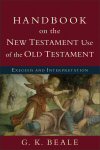
Handbook on the New Testament Use of the Old Testament: Exegesis and Interpretation
- Author: G. K. Beale
- Publisher: Baker Academic
- Publication Date: 2012
- Pages: 208
This concise guide by a leading New Testament scholar helps readers understand how to better study the multitude of Old Testament references in the New Testament. G. K. Beale, coeditor of the bestselling Commentary on the New Testament Use of the Old Testament, focuses on the “how to” of interpreting the New Testament use of the Old Testament, providing students and pastors with many of the insights and categories necessary for them to do their own exegesis. Brief enough to be accessible yet thorough enough to be useful, this handbook will be a trusted guide for all students of the Bible.
This handbook provides readers with a wonderful overview of key issues in and tools for the study of the use of the Old Testament in the New. It is written at an accessible level without sacrificing depth. I expect it to become a standard textbook for courses on the subject (as it will be for mine) and the first book to which newcomers will be directed to help them navigate through these sometimes complex waters.
—Roy E. Ciampa, professor of New Testament, Gordon-Conwell Theological Seminary
In this book Greg Beale combines a beginner’s guide to the study of the use of the Old Testament in the New Testament with a detailed catalog of resource material, an illustrated exposition of the methods to be applied, and some discussion of the hermeneutical issues that arise. He himself has made notable forays into this field of study and draws on these to enrich the content of the book, making it not simply a survey of contemporary approaches but also a real personal contribution to the further development of our understanding of this crucial area of biblical studies. The volume thus compensates generously for the lack of a detailed introduction to the massive Commentary on the New Testament Use of the Old Testament edited by Beale and Don Carson.
—I. Howard Marshall, professor emeritus of New Testament, University of Aberdeen
This volume fills a gap by providing serious students of Scripture with a helpful tool for interpreting Old Testament citations and allusions in the New Testament. Beale’s magisterial grasp of the subject enables him to present a complex and technical yet intriguing subject in such a way that mere mortals are equipped to engage in the study of the New Testament use of the Old Testament on their own.
—Andreas J. Köstenberger, senior professor of New Testament and biblical theology, Southeastern Baptist Theological Seminary
We have long needed a good book on the use of the Old Testament in the New. This is it. One might not agree with everything said here, but all readers will be challenged to think carefully about the issues raised. A solid work.
—Darrell Bock, research professor of New Testament studies, Dallas Theological Seminary
Greg Beale is well known for his contributions to the New Testament use of the Old Testament and the development of biblical theology. In this extremely useful handbook, we see how Beale goes about his task in terms of presuppositions, method, and the necessary reference tools for the task. The result is essential reading for anyone contemplating research in this area.
—Steve Moyise, professor of New Testament, University of Chichester
Greg Beale has distinguished himself throughout an illustrious teaching and writing career with his work on the relationships between the testaments. Fresh from producing his magnum opus, a New Testament biblical theology that was thoroughly informed by such uses, Beale here provides a much more manageably sized distillation of the main issues involved in understanding the New Testament’s use of the Old Testament. Strangely, it is the first such volume by an evangelical in some time. Fortunately, it is superbly done.
—Craig L. Blomberg, distinguished professor of New Testament, Denver Seminary
During the last four decades, not a little serious work has been undertaken to understand better how the New Testament cites the Old. Quite a lot of it was written by Greg Beale. Here, however, he keeps the student in mind and provides an introduction to the subject, complete with helpful bibliographies, useful illustrations, and step-by-step demonstrations of how to think through these issues. Not only seminary students but also pastors committed to expository preaching will be hugely thankful for this important handbook.
—D. A. Carson, research professor of New Testament, Trinity Evangelical Divinity School
No subject is more important to the interpretation of the New Testament and biblical theology than the study of the Old Testament in the New Testament. It is also one of the most technical and difficult subjects. Written by a veteran and pioneer in the field, Handbook on the New Testament Use of the Old Testament is a reliable guide through challenging terrain. Highly recommended to anyone who wants to work hard at appreciating the profound connections between the testaments.
—Brian S. Rosner, principal, Ridley Melbourne
In his Handbook on the New Testament Use of the Old Testament, Professor Beale has provided readers with a guide that complements his magisterial New Testament Biblical Theology: The Unfolding of the Old Testament in the New as well as the Commentary on the New Testament Use of the Old Testament, which he and several colleagues produced. What we now have is a complete package: commentary, theology, and a very concise handbook that shows us step by step how this important work is to be done. Beginning students and veteran scholars alike will benefit from this useful book.
—Craig A. Evans, Payzant Distinguished Professor of New Testament, Acadia Divinity College, Nova Scotia, Canada
G. K. Beale is a professor of New Testament and biblical theology at Westminster Theological Seminary in Philadelphia, Pennsylvania. He is a coeditor of the Commentary on the New Testament Use of the Old Testament and the author of numerous books.
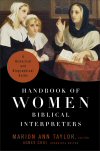
Handbook of Women Biblical Interpreters: A Historical and Biographical Guide
- Authors: Marion Ann Taylor and Agnes Choi
- Publisher: Baker Academic
- Publication Date: 2012
- Pages: 592
The history of female interpreters of the Bible is a neglected area of study. Marion Taylor presents a one-volume reference tool that introduces readers to a wide array of female Bible interpreters from the entire history of Christianity, from the early church to the twenty-first century. Her research has implications for understanding biblical interpretation—especially the history of interpretation—and the contemporary study of women and the Bible.
Contributions by over 125 top scholars introduce foremothers of the faith who address interpretive issues continuing relevance in faith communities today, such as women’s roles in the church and synagogue and the idea of religious feminism. Women’s interpretations also raise awareness about differences in the ways women and men may read the Scriptures in light of their differing life experiences. This text will prove useful to students, scholars, and pastors, who will be inspired, provoked, and challenged by the women introduced in the handbook. It provides a foundation for further detailed research and analysis.
This handbook is a gold mine, a must for all who care about women and religion or the history of the reception of the biblical texts. Page after page, article after article, I found myself riveted by what I was learning.
—Dale C. Allison Jr., Errett M. Grable Professor of New Testament and Early Christianity, Pittsburgh Theological Seminary
For over 1,600 years now, women have been carefully studying the Bible. Strangely, scholars have not seemed to wonder what they having been thinking about it all this time. Through pioneering and painstaking research, the Handbook of Women Biblical Interpreters brilliantly puts on display the insights and reflections of half the population on the most important book in the history of the world. I have been waiting eagerly for this handbook, and I will henceforth consult it frequently and with delight. All serious students of the Bible need to add it to their collection—especially those who don’t think they need it.
—Timothy Larsen, McManis Professor of Christian Thought, Wheaton College
This exhilarating volume can justly be described as one of the finest fruits yet to be harvested from the past half century of work on women’s history and women’s relationships to the interpretation of the Bible from the early church to the present. Marion Ann Taylor has included a judicious but generous selection of women biblical interpreters, individual contributors rank among the world’s experts, and the articles themselves frequently treat readers to excerpts from these women’s original writings. Those who go in search of particular entries will find themselves drawn to read more than what they went looking for because the stories encapsulated here are by turns surprising, fascinating, wry, poignant, and heartening.
—John L. Thompson, professor of historical theology, Fuller Theological Seminary
This deeply researched and beautifully organized volume fills a huge gap; one which most biblical scholars and church historians never noticed was there. It yields insight into how richly and variously the Bible functioned in diverse communities, from late antiquity to modern times, as reflected in the lives and writings of remarkable women. The history of biblical interpretation will never look the same again.
—Ellen F. Davis, Amos Ragan Kearns Professor of Bible and Practical Theology, Duke Divinity School
What an extraordinary, fascinating, enthralling, moving, and mind-expanding volume! This guide has achieved a vital recovery of interpretive sources and makes it clear that these interpreters must be explored and seriously considered not only by those thirsting to find women’s voices but also by anyone who desires to be comprehensively informed about the true scope and history of biblical interpretation.
—John Goldingay, David Allan Hubbard Professor of Old Testament, Fuller Theological Seminary
This most welcome handbook provides a wealth of information about an overlooked dimension of the history of biblical interpretation, the contribution of women interpreters. A fine collection of contributors focus on a wide variety of women interpreters through all periods of history. The array of interpreters covered here is breathtaking when one reads the biographies of those who, against deep odds and through major difficulties, provided biblical understandings that resonate today in many places. Marion Ann Taylor has made a real contribution in a number of ways with this expertly edited volume which recovers and analyzes women’s voices. This splendid work deserves a primary place among biblical interpretation resources and much praise for its extensive and exciting discoveries.
—Donald K. McKim, editor, Dictionary of Major Biblical Interpreters
This handbook is as important as it is fascinating—important for its unparalleled ability to give ear to voices long forgotten, often silenced, and fascinating for the way it turns the spotlight on the difficult but spectacular story of how women have engaged the Scriptures as they worked to take their rightful places in pulpits, at lecterns, and around the tables of biblical interpretation. Turning page after page, I found myself sometimes amazed, sometimes humbled, and often inspired by the courage and wisdom of the biblical interpreters whose lives and contributions are here gathered.
—Joel B. Green, professor of New Testament interpretation, Fuller Theological Seminary
What a gift and an invitation this book is! For too long I have been frustrated at my own lack of knowledge about the history of reception of the Bible , in particular, the history of women’s interpretive engagement with the Bible. With neither the knowledge of where to begin or even a sense of what I was looking for, I was helpless. Marion Taylor’s astonishing book changes everything. The judicious choice of women interpreters from antiquity to the twentieth century, the succinct but informative articles, and the immensely valuable bibliographies suddenly make it possible to teach and to write about women’s interpretation of the Bible throughout history. I can’t wait to get started.
—Carol A. Newsom, Charles Howard Candler Professor of Old Testament/Hebrew Bible, Emory University
The Handbook of Women Biblical Interpreters is an elegantly written collection of entries examining women’s influential reflections on Scripture and their own female identity. Each entry provides an enticing glimpse of a woman’s engagement with the biblical text and frames her contribution in its historical setting. These readings of Scripture speak afresh into our own time, enriching and invigorating our understanding of the Bible.
—Lynn H. Cohick, professor of New Testament, Wheaton College
Taylor and Choi provide a fascinating glimpse into the stories and writings of women across two thousand years of history. We are introduced to such diverse biblical interpreters as Elizabeth Achtemeier, Marie Guyart, Hildegard of Bingen, Julian of Norwich, Dorothy Sayers, Sojourner Truth, and Harriet Beecher Stowe. Bringing together 180 female interpreters into a single volume provides a rare gift, since women’s voices have often been neglected in the history of interpretation. This handbook is a unique and valuable resource for any seeking to understand Scripture by listening to the historical community of faith.
—Jeannine Brown, professor of New Testament, Bethel Seminary
The strength of this volume arises from the range of interpreters of the Bible, the theological spectrum they represent, and the new doors that they open on history. To cover so many women, many of whom were silenced or forgotten, and to do so with evenness and compression is a remarkable achievement. Anyone interested in the history of biblical interpretation, preaching, and Bible teaching will find essential, captivating reading in these pages.
—Paul Scott Wilson, professor of homiletics, Emmanuel College, University of Toronto
Marion Ann Taylor is a professor of Old Testament at Wycliffe College, University of Toronto, where she has taught for more than 25 years. She has devoted her scholarly research to the history of the interpretation of the Bible and has recently focused on women interpreters of the Bible in the nineteenth century. She is coeditor of Recovering Nineteenth-Century Women Interpreters of the Bible.
Agnes Choi is an assistant professor of New Testament at Pacific Lutheran University in Tacoma, WA.
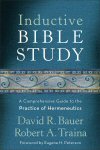
Robert Traina’s classic Methodical Bible Study transformed the way many people studied the Bible in the latter half of the twentieth century, becoming recognized as the most authoritative presentation of inductive Bible study available. This new work introduces the practice of inductive Bible study to a new generation of students, pastors, and church leaders. The authors, two seasoned educators with over 60 combined years of experience in the classroom, offer guidance on adopting an inductive posture and provide step-by-step instructions for inductive Bible study. They engage in conversation with current hermeneutical issues, trends, schools, and figures as they set forth well-grounded principles and processes for biblical interpretation and appropriation.
The book offers a holistic and integrated approach to the study of the Bible, showing how readers can bring together the various facets and methods of biblical study to arrive at original, penetrating, well-grounded interpretation and contemporary appropriation. The process presented incorporates various methods of biblical study to help readers hear the message of the Bible on its own terms. Inductive Bible Study includes a sustained example of the entire process, based on 2 Timothy 3:16–17, as well as many examples of specific exegetical aspects and tasks from throughout the biblical canon. It will benefit professors and students in courses on Bible study methods, interpretation, and hermeneutics as well as pastors and church leaders.
I have personally used Bauer and Traina’s method of inductive Bible study for more than 25 years and can testify to its effectiveness for understanding Scripture in ways that are both academically responsible and pastorally relevant. The approach allows Scripture to reveal itself, to speak on its own terms in ways that overcome the limitations and presuppositions of its readers. It allows the Bible to surprise us, challenge us, comfort us, or correct us in the very fashion that the original authors and the God who inspired them would want. This volume presents that time-honored approach for a new generation—and it is a remarkable achievement! Students will appreciate a text that is so immediately accessible and, eventually, will come to treasure this volume as a handbook to be consulted repeatedly throughout their professional careers.
—Mark Allan Powell, professor of New Testament, Trinity Lutheran Seminary
Many of us learned years ago to begin Bible study for ourselves with ‘observation, interpretation, and application,’ doing as much as possible on our own before turning to other resources. We may not have known one of the classic sources that outlined this method in comprehensive detail by Robert Traina. Now masterfully updated, with state-of-the-art scholarship and bibliographic references, this tome has been made useful for a new generation by David Bauer and Robert Traina. Part hermeneutics, part exegesis, part philosophy and logic, with numerous illustrations from Scripture itself, Inductive Bible Study does not supplant the standard works in each of these areas but helpfully supplements many of them.
—Craig L. Blomberg, distinguished professor of New Testament, Denver Seminary
For half a century, Robert Traina’s method of inductive Bible study has taught students the most important critical-thinking skill of all: how to read! His method trains people to attend closely to what is in a text and what is not in a text, to follow a text’s argument, and to map its narrative flow. Now David Bauer adds to the collaborative mix his own formidable strengths as an experienced teacher of inductive Bible study and as an internationally recognized biblical scholar. Together they present a finely honed guide to the process of observation, interpretation, and appropriation, enhanced with examples of how to execute each step and with helpful discussions about both the place of their approach in the landscape of contemporary hermeneutical debates and the connections between critical approaches and their inductive method. This volume lays an essential foundation for critical analysis and careful exegesis.
—David A. deSilva, Trustees’ Distinguished Professor of New Testament and Greek, Ashland Theological Seminary
This is the strength of Bauer and Traina’s book, Inductive Bible Study: it starts from square one by training people to attend to the content of Scripture, to follow a text’s argument, map its narrative flow, and grasp its implications. . . . The volume is rife with helpful discussions about the range of contemporary hermeneutical debates. Dots are connected from these technical considerations to the inductive method, resulting in an exegesis handbook that is both practical and substantive.
—Credo
David R. Bauer is the Ralph Waldo Beeson Professor of Inductive Biblical Studies and the dean of the School of Biblical Interpretation and Proclamation at Asbury Theological Seminary. He is the author of several books, including An Annotated Guide to Biblical Resources for Ministry.
Robert A. Traina (1921–2010) was a professor of English Bible at The Biblical Seminary in New York and at Asbury Theological Seminary for over 40 years. He received his PhD from Drew University and authored the influential classic Methodical Bible Study.
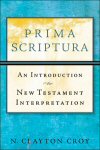
This engaging introduction to New Testament exegesis will appeal to seminarians and undergraduates across the academic spectrum. Clayton Croy, the author of a successful Greek textbook and an expert on Bible study pedagogy, provides an accessible, holistic overview of the entire interpretive process. He argues that while Scripture occupies a place of primary importance in faith and life, it does not do so in a vacuum. It operates in conjunction with two thousand years of Christian tradition, Spirit-guided human reason, and experience. Scripture’s authority is therefore primary but not exclusive. Croy begins with the preparation of the interpreter, proceeds to the analysis of the text, and concludes with discussion of the message of Scripture in the context of modern faith communities. He combines a step-by-step plan for historical exegesis with substantive discussion of broader hermeneutical issues.
Prima Scriptura interacts with recent scholarship and maintains both academic rigor and an engaging style, incorporating anecdotes, humor, scriptural illustrations, and examples of the practical payoff of disciplined interpretation. Each chapter includes discussion questions and suggestions for further reading. Professors and students working in exegesis and hermeneutics will value this work.
Clayton Croy’s combination of Christian theology, hermeneutical theory, and exegetical practice is ecumenical, fluent, and comprehensive, which allows for a versatility uncommon in introductory texts on this topic. Croy grounds his treatment of exegetical practices on the theological nature of Scripture and on the sort of faithful interpreter who can best render a sacred text for today’s world. Each section concludes with excellent annotated bibliographies of resources and teacher-friendly exercises that will make this book useful for the classroom.
—Robert Walter Wall, Paul T. Walls Professor of Scripture and Wesleyan Studies, Seattle Pacific University
This book equips Christian ministry students for mature and critical engagement of author-centered, text-centered, and reader-centered interpretative theories, warning against facile or faddish escape into one or another extreme. Croy provides a clear and sufficient guide to the art of asking good questions of the biblical text and of finding reliable answers, laying a solid foundation for the practice of a wide range of exegetical skills and the development of a sound hermeneutical model. His driving interest is to equip students to interpret Scripture in order to practice its truth in every sphere of life—from the personal to the political, from the individual to the international—fulfilling Johannes Bengel’s vision for biblical interpretation: apply yourself fully to the text, and apply the text fully to yourself. I look forward to using it in my own classroom.
—David A. deSilva, Trustees’ Distinguished Professor of New Testament and Greek, Ashland Theological Seminary
Prima Scriptura does not stop with its crystal-clear, step-by-step instruction; it also guides the reader into informed reflection on the hermeneutical issues that all interpreters face. The work is sophisticated yet accessible, serious yet lively, faithful yet critical. Packed with useful resources, this book is what ministerial and doctoral students need and what their exegesis teachers have been looking for.
—Susan R. Garrett, professor of New Testament, Louisville Presbyterian Theological Seminary
Everything that comes up in interpretation is here; the author somehow managed not to turn this book in to a 1,000 page door stop and learned to summarize and simplify and move on. . . . Interpretation is learned by doing, not by reading about it. But you need a good book to get you started, and Croy’s book is that book. I highly recommend [it].
—Jesus Creed blog
Students of the Bible wrestling with issues of hermeneutics and application as they interpret it stand to benefit from N. Clayton Croy’s exegetical handbook. . . . [It] offers a basic introduction to text criticism, lexical study, grammar, structure, genre . . ., historical context, and the use of commentaries, all in a step-by-step format, articulately, and with helpful illustrations, exercises, and richly annotated bibliographies . . . along the way. Commendably, Croy also discusses at considerable length textual connections and theological interpretation. . . . While it obviously concerns hermeneutics, the emphasis on preparation and the spiritual qualifications of confessional readers gives the book a strong devotional flavor, shared by the final two stages of his method, contemporizing and appropriating the text obediently. This flavor and the book’s hermeneutical awareness are its outstanding strengths.
—Themelios
Croy has managed to produce, in short compass, a manual that capably handles questions about the hermeneutics of meaning, the process of basic exegesis, and the main obstacles and challenges of applying the biblical text to the modern situation all in one place. . . . Croy’s text has a number of useful appended items. . . . This book was a joy to read and offers a treasure trove of tips for exegesis as well as numerous witty anecdotes. Croy is remarkably comfortable discussing both theoretical as well as practical matters. . . . I highly recommend this book to anyone interested in hermeneutics and theological interpretation of Scripture.
—Expository Times
N. Clayton Croy is an associate professor of New Testament at Trinity Lutheran Seminary in Columbus, Ohio. His previous books include a commentary on 3 Maccabees, The Mutilation of Mark’s Gospel, and A Primer of Biblical Greek. He also contributed to the Dictionary of New Testament Backgrounds.
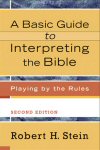
Learn how to identify various biblical genres, understand the meaning of biblical texts, and apply that meaning to contemporary life. Robert Stein provides lessons on multiple biblical genres, including historical narratives, legal codes, poetry, wisdom literature, prophecy, idioms, parables, hyperbole, and letters. Revised to reflect Stein’s current thinking and changes to the discipline over the past decade, this new edition of a classic text is an effective teaching tool for a host of biblical study settings.
This is an ideal book both for university and seminary courses and for laypersons who desire a guide to understanding the Scriptures.
—Thomas R. Schreiner, James Buchanan Harrison Professor of Biblical Interpretation, Southern Baptist Theological Seminary
The reader benefits from clear definitions of key concepts and creative examples of these concepts in action, as well as exercises that can be used to augment the learning process.
—Jeannine K. Brown, professor of New Testament, Bethel Seminary
The quality and terseness with which this book has been written and the way the various topics have been discussed is outstanding . . . it even bids the academic to examine whether he or she is still clear about the basics.
—Bálint Károly Zabán, Review of Biblical Literature
What the reader will find helpful, especially when using this book for teaching purposes, is its numerous scriptural examples, timely illustrations, and clarifying schematics.
—James D. Hernando, Encounter Journal
Robert H. Stein was senior professor of New Testament interpretation at Southern Baptist Theological Seminary. He previously taught at Bethel Seminary. A world-renowned scholar of the Synoptic Gospels, he is the author of several books, including Jesus the Messiah: A Survey of the Life of Christ, Mark in the Baker Exegetical Commentary on the New Testament (BECNT) (16 vols.) series, and Luke in the The New American Commentary Series (NAC) (41 vols.).
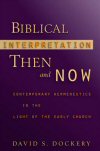
Biblical Interpretation Then and Now: Contemporary Hermeneutics in the Light of the Early Church
- Author: David S. Dockery
- Publisher: Baker
- Publication Date: 2000
- Pages: 248
Biblical Interpretation Then and Now examines the use of the Bible in the early church and relates apostolic and patristic interpretation to contemporary trends in hermeneutics. David Dockery traces the developments in early Christian interpretation, noting both continuities and discontinuities. His study begins with Jesus, and observes the developments in interpretation to the time of the historic Council of Chalcedon, noting the philosophy, theology, and traditions which influenced each period.
Provides readers with a generally able and well documented survey of patristic biblical interpretation and a significant discussion of the potential importance of earlier patterns of interpretation to contemporary hermeneutical discussion.
—Richard A. Muller, Calvin Theological Journal
Those seeking a general introduction to patristic hermeneutics will be grateful once again for this book’s availability.
—Amos Yong, Religious Studies Review
A useful survey for beginning students: the writing is clear, the overall appraisal of the period follows generally accepted lines, and the attention to contemporary concerns can help the reader approach the topic with a valuable perspective.
—Moisés Silva, Westminster Theological Journal
A well-documented, readable, and welcome addition to one’s theological library.
—Roy B. Zuck and Joe Walters, Bibliotheca Sacra
David S. Dockery is president of Union University in Jackson, Tenn. Formerly professor of New Testament at Southern Baptist Theological Seminary, he is the author or editor of over ten books, including Interpreting the New Testament, Theologians of the Baptist Tradition, and the Holman Concise Bible Commentary.